Is there a zoo near here五年级说课
- 格式:ppt
- 大小:994.00 KB
- 文档页数:15
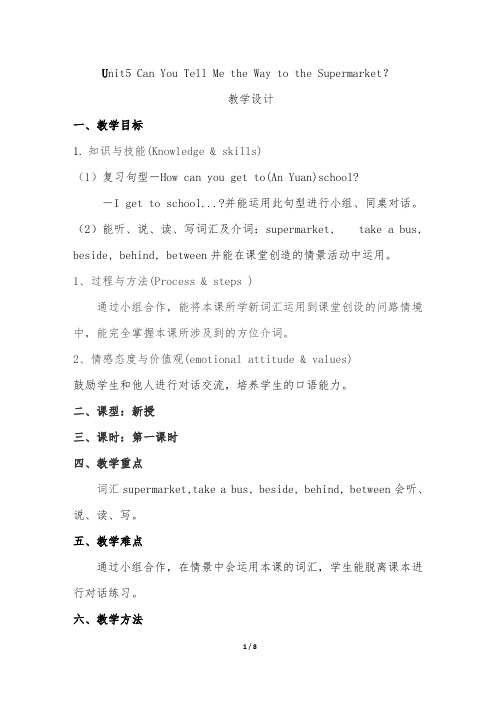
U nit5 Can You Tell Me the Way to the Supermarket?教学设计一、教学目标1.知识与技能(Knowledge & skills)(1)复习句型-How can you get to(An Yuan)school?-I get to school...?并能运用此句型进行小组、同桌对话。
(2)能听、说、读、写词汇及介词:supermarket, take a bus, beside, behind, between并能在课堂创造的情景活动中运用。
1、过程与方法(Process & steps )通过小组合作,能将本课所学新词汇运用到课堂创设的问路情境中,能完全掌握本课所涉及到的方位介词。
2、情感态度与价值观(emotional attitude & values)鼓励学生和他人进行对话交流,培养学生的口语能力。
二、课型:新授三、课时:第一课时四、教学重点词汇supermarket,take a bus, beside, behind, between会听、说、读、写。
五、教学难点通过小组合作,在情景中会运用本课的词汇,学生能脱离课本进行对话练习。
六、教学方法小组合作实践法讲授、提问等。
七、教学过程I. 课前热身T: Good afternoon, everybody. I’ m Miss Jiang, your English teacher, today. I like making friends. Hello, girl, do you want a new friend? S1: Yes. T: Try me! What about you? Do you want a new friend? S1:Yes. T: Try me. I hope, after this class, we can be good friends. OK? I feel so happy to her that.Now, let’s go on learn U nit5 Can You Tell Me the Way to the Supermarket?First, let’s enjoy a song. If you like, you can sing it. ...------What did you hear from this song?(将学生分成四大组,若干个小组,那一组回答问题积极或答对,可以得到相应的粘贴,最后哪一组获得多,可以得到相应的的奖励。
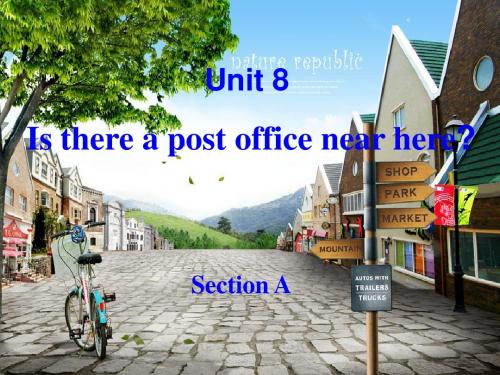

六年级毕业复习——补全对话专项(1)1Jack is visiting Beijing on his summer holiday. He wants to get to the zoo. Now he is asking the way. Jack: Excuse me._________________ Kerry: I ’m sorry. I ’m new here.Jack:________________________Jack: Excuse me. Is there a zoo near here?Policeman: Yes, the zoo is next to the supermarket.Jack: Is it far?Policeman:_________________.It ’s just 5 minutes walk.Jack:_____________________Policeman: Go across the traffic lights and turn right. Jack: Thank you. Policeman: You ’re welc ome. Have a good time.Jack:_______________2The summer holiday is coming. Tom and Peter are talking about their plans on the phone. Tom : Hello, this is Tom. Can I speak to Peter? Peter : ______________________. Tom: ______________________? Peter : I am doing my homework.Tom: The summer holiday is coming.___ ___________? Peter: I am going to Hangzhou . Tom: What are you going to do there? Peter:________________________. Tom: Wow! It sounds great!Peter: __________________________?Tom: I am going to the USA with my parents. We will buy lots of gifts there.Peter: Have a good time! // Tom: ______________. Goodbye! // Peter: See you!3A: What time did you come home last night, Tom?B: _________________. Maybe about half past eleven.A: ____________ .B: Well. I came in quietly. I didn't want to wake you up, mum. A: Did you play the computer games?B: No, ____________ . Mum.A: ________________?B: I went to the cinema.A: Why did you come home so late? _______________? B: No, it didn ’t. _______________.A: Good job. We should help each other.A. How about you?B. Thank youC. I am going to visit many beautiful places and eat delicious food.D. Speaking.E. What are you doing now?F. Where are you going?G. When are you going?A. Where did you go then ?B .I didn ’t hear you at that time .C. Did the film go on until midnight ?D. Oh, I don ’t know .E .I didn ’t like it at all ,you know . F. How did you come back home? G .Peter was i11.So I went to his home and help him with his lessons .A: That ’s OK.B: Yes, it is.C: No, it is near. D: Thank you E: Where is the zoo, please?F: How are you?G: How can I get there?4Mike and John are good friends. They are looking at the photos in John’s room.Mike:John._____________John: It was so happy. We had a big trip last trip last winter holiday. We took many pictures there. Mike:________________John:Sure, here you are.Mike: Wow! The pictures are so beautiful._____________ John: We went to Harbin.Mike:______________John: We went by train, I played computer games on the train. Mike:_______________John:We made a snowman and went skiing in the park.Mike:______________John: Yes, we had a good time in Harbin,5A: Look at this picture. What a beautiful city!B:_____________________A: ____________________B: It’s east of China.A:_________________B:Yes, it’s far.A: How do you usually go back to Shanghai?B:Usually I go by train. But sometimes I fly there.____________ A:__________________B:Yes, there are.A: I like Shanghai food very muchB:____________________ Come to my home this weekend.She will be very happy to cook for you.A: Your mom is so nice! And thank you so much.6 A: Hi, John.__________B: It was good.A: ____________________B:I visited my grandpa with my parents.He was illA:__________________B: Not at all.A:__________________B: He had a cold.A:_____________________B:Yes, he did. He took some medicine.A:________________________B: He feels better now. Thank you. A. What did you do in Harbin?B. Did you have a good time?C. How was your holiday?D. How is your holiday?E. How did you go?F. Where did you go?G. May I have a look?A. Are there any good food there?B. My mom can cook it well.C. My dad can cook it well.D. It’s my hometown Shanghai.E. It’s fast.F. Where is it?G. It is far form Dongguan.A.What did you do?B.Did he go to see the doctor?C.How do you feel?D.What was matter with yourgrandpa?E.I am sorry to hear that.F.How was your weekend?G.How does he feel now?A:Hello! Mid-Autumn Festival is coming._________B: I am going to have a big dinner with my family._____________A: Yes, and we are going to eat mooncakes, too.B:_________________________A:No, but we have Christmas Day.B: I know it. It is fun, too.A: I have some stories about Santa.__________B:Sure.8A: Hi, Cindy.____________________B:I don’t feel well.A:__________________B:I am afraid I had a cold.A:Oh,__________. You must go to see a doctor.B: Yes, I am going to the hospital this afternoon.A:___________________B: We are going by car.A: You should drink more water._____________B: Thank you.9A:Hi,Jim.______1__________B:I usually go to the library on Sundays.A: ______2__________B:I go there by bus.A: ______3__________B:Yes , it is.A: _______4_________B:My home is next to the bank.A: _______5_________B:Of course. Let’s go.10A:__1________B:It’s March 8th .A:Oh, it’s Women’s Day. I want to buy a new dress for my mother in the shopping centre.__2__________ B:It’s in front of the post office.A: ___3_________B:Yes . It’s only 5 minutes walk.A: _______4__________B:Go straight for 3 minutes. Then turn left at the bookstore. A:Thank you.B: ________5_________ A.Do you like mooncakes?B.Do you have this Mid-AutumnFestival in England?C.Do you want to know them?D.Are you going to sing a song?E.What about you?F.What are you going to do?G.Are you going to get together withyour family?A.I’m happy to hear that.B.How are yo going there?C.What’s the matter with you?D.How are you?E.I am sorry to hear that.F.I wish you get better soon.G.Where are you goingA.Can I go with you?B.How can we go to the library?C.Is the library far from your home?D.Do you want to go with me?E.Where is your home?F.How do you go to the library?G.What do you usually do on Sundays.A.Is it far from here?B.You are welcome.C.What day is it today?D.Where is the shopping centre?E.How can I get there ?F.What 's the date today?G.Is it near here?Sarah:Hello !Mike.Tomorrow is Saturday.__ 1_____Mike:I am going to Guangzhou Bookstore.Sarah:Good idea! I want to go, too.___2______ Mike:.I ’m going at 9:30 in the morning.Sarah: _________3______ Mike:I am going to buy a Chinese-English Dictionary,too.Sarah:___4______Mike:I am going by bus. It ’s two yuan. It ’s cheap.Sarah:________5_____Mike:The bookstore is in front ot the cinema. See you tomorrow.12A: This is my family photo.B: __________1____________ A: Nine.B: _________2_____________A: He ’s my father.B: ________3______________ A: He ’s a doctor.B: ________4______________A:Yes,she is .A: What does she do?B: She ’s a teacher.B: _________5_____________A:She works in Yucai Middle School.13A:________1_________B: I often read books on the weekend.A: _______2__________B:No, I ’m going to visit my grandparents thisweekend.A: _______3__________B:I ’m going there by car. My parents will go withme.A: _______4__________B:He is a Chinese teacer. A: _______5__________B:No, my grandma is an accountant.A How are you going?B Where is the bookstore? C.Are you going at 9:30 in the morning? D.What are you going to buy in the bookstore? E. When are you going?F.Where are you going tomorrow?G. How do you go there?A: Who ’s this man B: Who is she? C: Is this your mother? D: How many people are there in your family?E: What ’s your father?F. What does she do?G .Where does she work?A: Who ’s this manB: Who is she? C: Is this your mother? D: How many people are there in your family?E: What ’s your father?F. What does she do?G .Where does she work?14A: I went to Shanghai with my family during May Day holiday.B: __________A: It was wonderful!_____ __I had a great time there.B:How did you go there?A:________B: Did you eat good food there? A: _________ _B: What did you do there?A:_____ ____ A. Yes, we did.B. By plane.C. The people there were very friendly.D. Really? How is your trip?E. We took pictures and visited museum.F.Really? How was your trip?。
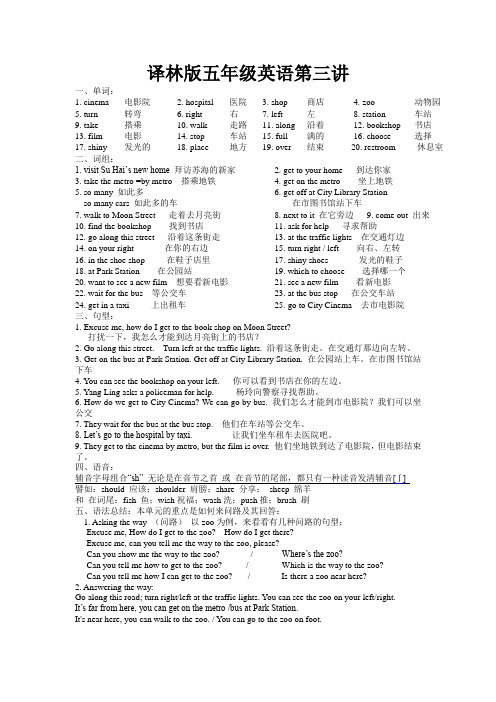
译林版五年级英语第三讲一、单词:1. cinema 电影院2. hospital 医院3. shop 商店4. zoo 动物园5. turn 转弯6. right 右7. left 左8. station 车站9. take 搭乘10. walk 走路11. along 沿着12. bookshop 书店13. film 电影14. stop 车站15. full 满的16. choose 选择17. shiny 发光的18. place 地方19. over 结束20. restroom 休息室二、词组:1. visit Su Hai’s new home 拜访苏海的新家2. get to your home 到达你家3. take the metro =by metro 搭乘地铁4. get on the metro 坐上地铁5. so many 如此多so many cars 如此多的车6. get off at City Library Station在市图书馆站下车7. walk to Moon Street 走着去月亮街8. next to it 在它旁边9. come out 出来10. find the bookshop 找到书店11. ask for help 寻求帮助12. go along this street 沿着这条街走13. at the traffic lights 在交通灯边14. on your right 在你的右边15. turn right / left 向右、左转16. in the shoe shop 在鞋子店里17. shiny shoes 发光的鞋子18. at Park Station 在公园站19. which to choose 选择哪一个20. want to see a new film 想要看新电影21. see a new film 看新电影22. wait for the bus 等公交车23. at the bus stop 在公交车站24. get in a taxi 上出租车25. go to City Cinema 去市电影院三、句型:1. Excuse me, how do I get to the book shop on Moon Street?打扰一下,我怎么才能到达月亮街上的书店?2. Go along this street. Turn left at the traffic lights. 沿着这条街走。
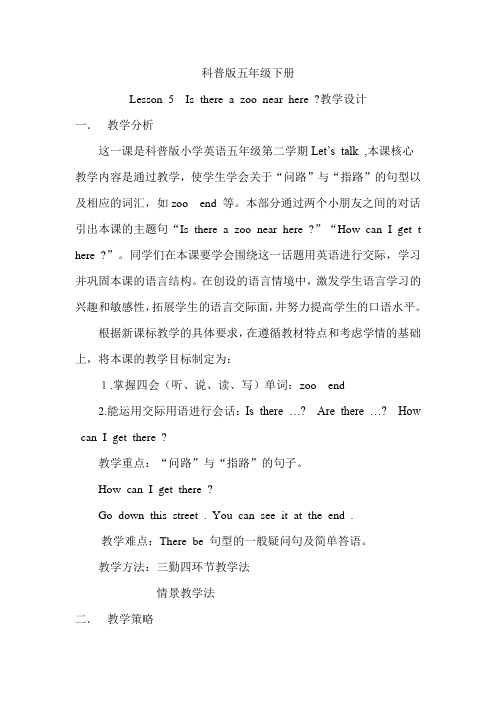
科普版五年级下册Lesson 5 Is there a zoo near here ?教学设计一.教学分析这一课是科普版小学英语五年级第二学期Let’s talk ,本课核心教学内容是通过教学,使学生学会关于“问路”与“指路”的句型以及相应的词汇,如zoo end 等。
本部分通过两个小朋友之间的对话引出本课的主题句“Is there a zoo near here ?”“How can I get t here ?”。
同学们在本课要学会围绕这一话题用英语进行交际,学习并巩固本课的语言结构。
在创设的语言情境中,激发学生语言学习的兴趣和敏感性,拓展学生的语言交际面,并努力提高学生的口语水平。
根据新课标教学的具体要求,在遵循教材特点和考虑学情的基础上,将本课的教学目标制定为:1.掌握四会(听、说、读、写)单词:zoo end2.能运用交际用语进行会话:Is there …? Are there …? How can I get there ?教学重点:“问路”与“指路”的句子。
How can I get there ?Go down this street . You can see it at the end .教学难点:There be 句型的一般疑问句及简单答语。
教学方法:三勤四环节教学法情景教学法二.教学策略根据本课的内容和目标,以及学生的年龄特点等。
我将采用以下教法:(1)听录音,纠正学生的语音、语调,给学生纯正的英语语音。
(2)利用单词卡片,动物卡片,给学生最直观的感受,通过师生双方的口语交际,激发学生的学习兴趣。
(3)最后,用Let’s si ng来结束本课的内容,歌曲轻松愉快,为学生创设了轻松和谐的英语学习氛围。
Lesson 5 Is there a zoo near here ?(第一课时)教学过程定向诱导1.Greetings.(师生问好)2.还记得我们上节课讲的单词吗?以抢答的形式快速地说出来。
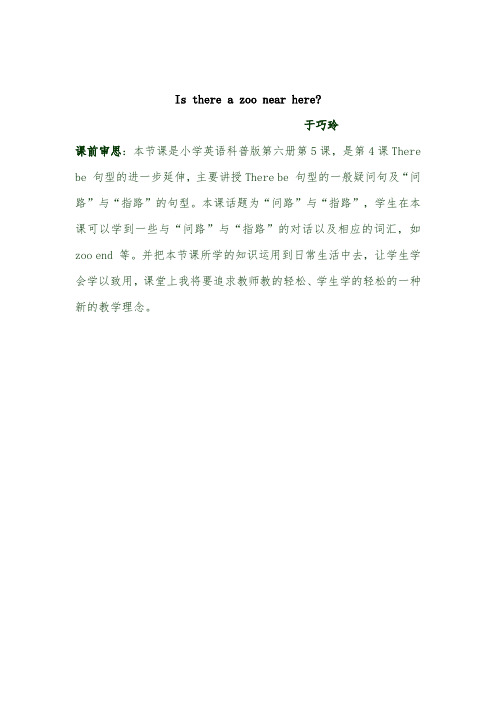
Is there a zoo near here?于巧玲课前审思:本节课是小学英语科普版第六册第5课,是第4课There be 句型的进一步延伸,主要讲授There be 句型的一般疑问句及“问路”与“指路”的句型。
本课话题为“问路”与“指路”,学生在本课可以学到一些与“问路”与“指路”的对话以及相应的词汇,如zoo end 等。
并把本节课所学的知识运用到日常生活中去,让学生学会学以致用,课堂上我将要追求教师教的轻松、学生学的轻松的一种新的教学理念。
教案:Is there a zoo near here?教学目标:1、能听懂、会说,能掌握there be 句型的肯否问答形式,并会替换词造句。
2、学习词组:at the zoo, near here, get there3、培养学生的观察能力和想象能力4、培养学生的合作、交流意识教学重点:教学难点:在肯定句、疑问句中some any 的区别教学准备:录音机图片Teaching steps一、Free talk二、New lesson1、根据教室里的东西引入新课T: Is there a TV in our classroom?Yes, there is.\No, there isn’t.T: Are there any books on the desk?Yes, there are.\No, there aren’t.(各种方法练习)2、简笔画出示动物园及熊猫3、学习课文的前半部分Excuse me. Is there a zoo near here? Yes, there is.Are there any pandas in the zoo? Yes, there are two.4、学习课文后半部分How can I get there?Go down this street. You can see it at the end.5、听录音,跟读课文。
Lesson 5 Is there a zoo near here?单元目标1.掌握本单元的重点词汇,如zoo,end等2.能听懂,会说,并能用look for来造句要点精讲重点词汇Zoo 动物园He saw some amazing sights at the zoo.他在动物园里看到一些珍禽异兽。
Did you see any elephants in the zoo last week?上星期你在动物园里看到大象了吗?They will go to the zoo or play volleyball.他们要去动物园或打排球。
The children are mad keen to go to the zoo.孩子们非常想去动物园。
I'll meet you at the entrance of the zoo tomorrow.明天我会在动物园的入口处和你见面。
End 重点,结束,末尾The debate ended in uproar.那场争辩以大吵大闹收场。
The battle finally brought the war to an end.这一仗使这场战争终告结束。
They ended the party off with a song.他们唱支歌结束了晚会。
At the end of the film, the hero wept bitterly.在影片的结尾,主人公伤心地哭了。
Office 办公室Station 车站He was walking up and down the station platform.他在火车站的月台上走来走去。
It is no more than ten minutes' walk from the station.由车站走到这里只有十分钟的路程。
Guards were stationed around the prison.卫兵派驻在监狱四周。
小学英语科普版五年级下册检测题小学英语科普版五年级下册检测题听力部分(40分)一、将你听到的单词序号填入题前的括号内(10分)。
()1、A、.speak B、.tell C、.bake()2、A、.job B、.must C、.light()3、A.、cross B、.ours C、.theirs()4、A、.sick B、.send C、.other()5、A.、wait B、.silly C、.number二、选出你听到的句子,将序号填在题前的括号内(10分)。
( )1、A.I can see twenty-one pens.B.I can see twenty-five pencils.C.I can see thirty-four pencils.( )2、A.Please count the books on the desk.B.Please count the books on the chair.C.Please take the books to the classroom.( )3、A.How many are there? Twenty-six.B.How many are there? Thirty-seven.C.How many can you see? I can see forty-two.( )4、A.Turn right,you can see it on the left.B.Turn right,you can see it at the end.C.Turn left,you can see it on the right.( )5、A.My husband is twice thirty.B.My husband is twice thirty-two.C.My father is seventy.三、听录音,填写所缺单词。
(10分)1、beautiful the stars are.2、Are you still looking the place?3、They are many in the playground.4、They are taking off a space station.5、Is there a zoo here?四、听录音,排序。
五年级英语《Is there a zoo near here!》说课稿本课是一篇阅读课文,主要围绕信件这一主题展开。
信中涉及了一般过去时、现在进行时及一般将来时。
本课时要求学生能够正确区分这三种时态,并在实际生活中灵活运用。
这三种时态在教材的不同地方曾经出现过,以往的教学中也有所讲解,本课是对小学阶段这三种时态的一个整合。
说学生作为中英校际交流学校之一,我校较为重视英语活动的开展,如英方校长的来访,一年一度的英语节,英语创新作业的实施等等,大部分学生逐渐感受到了英语的语言魅力,对英语学习有着较浓厚的兴趣。
经过五年的英语学习,学生已有一定的基础,良好的听、说、读、写习惯已初步形成,但也有少数学生由于长期以来遇到困难,学习兴趣减退,出现两极分化。
说目标:1. 教学目标新课程强调知识与技能、过程与方法、情感态度与价值观三个角度的有机结合,本着这样的认识,结合教材内容以及学生特点,我制定如下教学目标。
[认知目标] 学生能听懂、会说单词history, question, room, borrowed; 能读懂本信件;学生能区分一般过去时、现在进行时和一般将来时三种时态[能力目标] 学生在学中用、用中学,能用不同时态表达不同时间段的活动;听、说、读、写能力同时得到发展[情感目标] 学生在相互交流合作中增强合作精神;在整个学习过程中培养良好的竞争意识。
2. 教学重难点教学的重点是让学生掌握四会单词,读懂信件;比较三种时态的不同。
难点是让学生认识时态的变化,能够正确自如地用一般过去时、现在进行时和一般将来描述相关行为。
说教法:1.设计英语中有一句谚语:Education must be fun!根据《课标》、学生的认知规律,小学阶段的英语教学应实施“趣味教学”,以学生为主体,以活动为载体。
本课时我主要采用情景法、直观法教学方法,歌谣、活动、兴趣贯穿始终,精讲巧练,由浅入深,由易到难,突出重点,突破难点。
充分调动学生的积极性和主动性,使学生在愉快和自信的情绪中获取知识,在师生、生生之间的多想交流中进行有意义的练习,培养他们学以致用的能力。